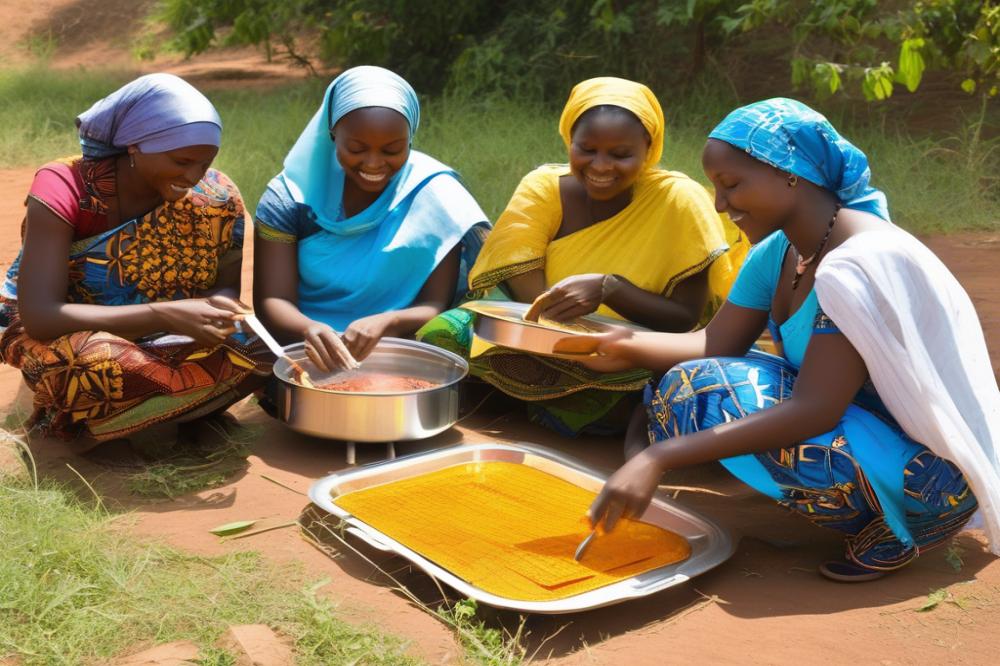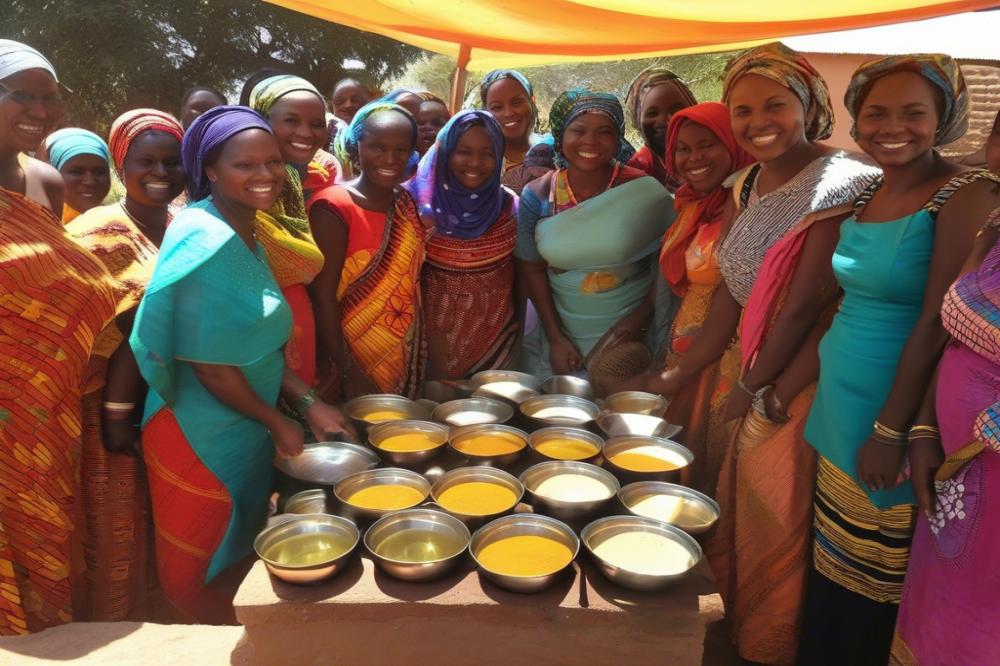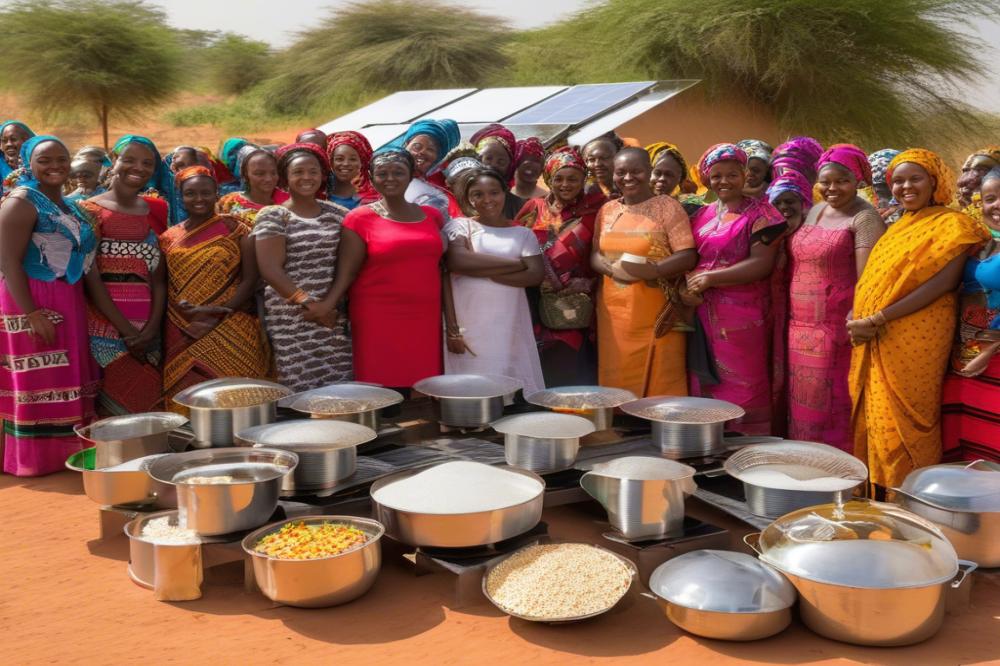Empowering Women Through Solar Cooking Projects in Sub-Saharan Africa
Solar Cooking is a transformative approach that utilizes the sun’s energy to prepare meals. In Sub-Saharan Africa, where access to traditional fuels presents many challenges, this method offers significant advantages. Women, often responsible for cooking and gathering fuel, face hardships that solar cooking can alleviate. The significance of embracing this renewable energy source extends beyond just meal preparation. It intertwines with broader themes of sustainable development and community growth.
Addressing women’s Empowerment through initiatives like solar cooking is essential. With less time spent collecting firewood or charcoal, women can invest more hours in education, income-generating activities, or community projects. This shift not only fosters personal growth but also promotes gender equality. When women are empowered, whole communities thrive. Their ability to influence decisions and participate in economic activities increases significantly.
The potential health benefits are noteworthy. Using solar energy reduces indoor air pollution, which is a major concern in many households. Families are less exposed to harmful smoke, leading to fewer respiratory illnesses. Moreover, the environmental impact is profound. Decreasing reliance on firewood supports forest conservation efforts. It also combats deforestation, which is crucial for maintaining biodiversity and combating climate change.
Communities can experience economic savings as well. By cutting down on the purchase of charcoal or firewood, families can allocate finances to other necessities. These savings can make a substantial difference in overall family wellbeing. When people invest in education or health services, the cycle of poverty can begin to break.
Through community projects focused on solar cooking, the ripple effects can change lives. Imagine a village where women teach each other this skill, creating both job opportunities and friendships. These initiatives symbolize hope, resilience, and progress. Overall, solar cooking not only empowers women but also nurtures the potential of entire communities in Sub-Saharan Africa. With every meal prepared under the sun, a brighter future is within reach.
Understanding Solar Cooking

Solar cooking is a method that uses the sun’s energy to cook food. This technique harnesses sunlight, converting it into heat through various designs. It helps reduce dependence on traditional fuels like wood, charcoal, or gas. That shift can be significant in regions where these resources are scarce or expensive.
Types of Solar Cookers and Their Mechanisms
Different types of solar cookers exist, each with unique features. Box cookers are common; they use an insulated box and retain heat like an oven. Parabolic cookers are also popular; they focus sunlight onto a cooking pot, reaching high temperatures quickly. Panel cookers use reflective panels to direct sunlight onto the cooking area, making them lightweight and portable. Each design has strengths, making solar cooking adaptable to various needs.
Benefits of Solar Cooking Compared to Traditional Methods
Utilizing solar energy carries multiple advantages. First, it leads to considerable health benefits. Indoor air pollution from burning fuels can cause severe respiratory issues. By cooking with sunlight, families can breathe cleaner air. Economic savings emerge as well. Many families spend significant amounts on fuel. Transitioning to renewable energy allows for reduced monthly expenses, freeing some money for other necessities.
Environmental impact is another crucial consideration. Fewer trees are cut down for fuel when solar cookers are used. This practice contributes to forest conservation and combats climate change. Moreover, educational opportunities arise through community projects that promote solar cooking. Training women in these techniques instills valuable skills and knowledge. Programs showcase sustainable development and inspire gender equality, empowering women throughout Sub-Saharan Africa. By participating in these initiatives, women not only gain practical skills but also become leaders in their communities.
The Role of Women in Renewable Energy

Women’s involvement in renewable energy is crucial for sustainable development. In Sub-Saharan Africa, access to energy shapes many aspects of life. When women engage in community projects, they help improve not just their families but entire neighborhoods. Fostering their participation leads to significant progress.
Challenges persist for women, especially concerning energy access. Many lack reliable supply, forcing families to rely on wood or coal. This dependence brings health issues like respiratory problems from smoke inhalation. Moreover, collecting firewood takes time away from education and work, limiting opportunities for generations.
Linking energy access and gender equality becomes evident. When women have the means to cook sustainably, they gain more than just health benefits. They also experience economic savings, which can empower them. Increased financial independence allows women to invest in education for their children, ultimately impacting the community.
By promoting renewable energy initiatives, societies can address both environmental impact and gender inequality. Empowering women to lead in these areas can yield positive change. It’s essential for everyone to understand that investing in women is a step toward a brighter future.
Community Projects Promoting Solar Cooking
Numerous initiatives focus on helping women in Sub-Saharan Africa through solar cooking projects. These programs not only provide essential tools but also support education and community engagement. For instance, in Uganda, women’s groups have successfully used solar ovens to prepare meals, reducing reliance on traditional cooking methods. This shift brings economic savings that families can use for other important needs.
Examples of Successful Solar Cooking Projects
One notable project is found in Kenya, where local organizations partnered with international NGOs. They distributed solar cookers to villages facing deforestation challenges. This effort aims to promote renewable energy while protecting the environment. Participants received training on using solar ovens effectively. Reports indicate that families who cook with solar energy spend less on fuel and firewood.
Collaboration with Local Organizations and International Support
The impact of these community projects relies heavily on collaboration. Local leaders play a vital role by connecting with women eager to learn new skills. Government support often boosts these efforts, ensuring broader reach and more sustainable development. International assistance brings in resources needed for training, materials, and outreach. Together, these partnerships create a stronger foundation for continued growth.
Impact on Women’s Livelihoods and Community Health
Women involved in solar cooking projects report improved health outcomes for their families. Reduced smoke exposure from traditional cooking methods lowers the risk of respiratory issues. Beyond health benefits, women gain valuable skills that enhance their economic independence. When families save money, they can spend more on education for their children. Enhanced knowledge about sustainable practices strengthens the community’s resilience to environmental challenges.
Gender equality also receives a significant boost through these initiatives. Empowering women leads to stronger communities. As these projects continue to evolve, they offer hope for a cleaner, healthier future in Sub-Saharan Africa. Supporting such community projects is essential for lasting change.
Health Benefits of Solar Cooking
Traditional cooking methods in Sub-Saharan Africa often rely on wood, charcoal, or other solid fuels. These options produce smoke that fills homes. The indoor air pollution can lead to serious health issues, especially for women and children. Switching to solar cooking can significantly reduce this problem. Cleaner air in the home contributes to better health outcomes.
Women are often the primary caregivers. They spend a lot of time cooking for their families. When they use cleaner cooking methods, their risk of respiratory diseases decreases. Children also benefit from cleaner air. It is a relief for families when they do not have to inhale harmful smoke daily.
Connection to Maternal and Child Health Outcomes
The link between cooking methods and health is clear. Maternal health improves when women have access to renewable energy solutions like solar cookers. Reduced emissions lead to a less hazardous environment for expectant mothers. Healthier mothers often result in healthier children, creating a cycle of well-being in communities.
Education is greatly impacted as well. When women face fewer health issues, they are more likely to engage in education and community projects. Healthier women can dedicate more time to learning and advancing their families. This, in turn, fosters economic savings for households. The implications for gender equality are significant. Empowering women through these initiatives helps communities progress toward sustainable development.
Beyond health, the environmental impact cannot be overlooked. Solar energy reduces the reliance on biomass fuels. This shift supports forest preservation, which benefits entire ecosystems. Families not only save money from reduced fuel costs but also contribute to a healthier planet.
Overall, the health benefits of adopting solar cooking practices touch various aspects of life. Healthier homes create brighter futures. Women, children, and indeed entire communities, can thrive when given the tools to cook sustainably.
Environmental Impact of Solar Cooking
Using solar energy to cook food changes many lives in Sub-Saharan Africa. Women benefit the most from these community projects. Traditional cooking often leads to deforestation. Trees are cut down for firewood, causing habitat loss. Less forest means more carbon emissions. When alternatives like solar cooking are available, this practice can change.
Transitioning to renewable energy sources plays a crucial role in minimizing resource depletion. By relying on the sun, families no longer need to gather wood or burn fossil fuels. This shift results in significant economic savings. Families can redirect funds usually spent on firewood toward education or healthcare.
Health benefits arise from using solar cookers. Indoor air pollution is a major concern. Open fires create smoke that can harm respiratory health. With solar cooking, homes are cleaner and safer. This also helps promote gender equality by reducing the burden on women, who typically manage household cooking.
Participating in sustainable development is more vital than ever. Communities can come together to adopt these technologies. Local initiatives that promote solar cooking can lead to greater awareness of climate issues. As more families convert to this technology, the impact on the environment grows. It contributes to broader climate change mitigation efforts by reducing reliance on non-renewable resources.
Implementing solar cooking initiatives fosters a culture of sustainability. This movement encourages individuals to learn about renewable energy and environmental responsibility. Engaging in these projects can create a ripple effect, inspiring others to adopt similar practices. Ultimately, it supports healthier future generations, with cleaner air and a resilient ecosystem.
Economic Savings and Empowerment
Reducing fuel expenses significantly impacts families in Sub-Saharan Africa. Traditional cooking methods often require firewood or charcoal, which can be costly. As these materials become scarcer, their prices rise. By adopting solar cooking, women can save money that would otherwise be spent on fuel. This economic savings allows families to allocate resources to other essential needs like education or healthcare.
Women involved in solar cooking projects can also discover new opportunities for income generation. Community projects promote the sale of cooked meals, attracting customers who seek affordable and healthy options. Some women take it a step further by organizing workshops, teaching others how to use solar stoves. This initiative can cultivate local entrepreneurship and spur economic growth in their communities.
Empowerment through Skills Training and Education
Participating in solar cooking initiatives often comes with resources for skills training. Workshops may cover various topics, including technical skills, nutrition, and business management. Education in these areas fosters self-reliance and boosts confidence. When women learn to harness renewable energy for cooking, they also become advocates for sustainable development in their regions.
With improved knowledge, the conversation around gender equality grows louder. Women gaining financial independence begins to challenge traditional norms. Empowered women are more likely to invest in their families’ well-being, promoting health benefits and better living conditions. Thus, the impact transcends individual households and reaches entire communities.
In a landscape fraught with challenges, these initiatives represent a path toward brighter futures. Engaging women in solar cooking projects not only enhances their economic status but also fosters a sense of community. This change positively influences societal perceptions of women’s roles, leading to lasting transformations across Sub-Saharan Africa.
Education and Awareness
Educating communities about the benefits of solar cooking is crucial. Many families in Sub-Saharan Africa rely on traditional cooking methods that harm both health and the environment. Awareness programs inform people about how renewable energy can transform their lives. Cooking with solar energy reduces smoke inhalation, leading to better health outcomes, especially for women and children.
Training programs targeting women and youth empower these key groups to adopt new technologies. Participants learn how to build and use solar cookers efficiently. Knowledge gained from these programs encourages individuals to take charge of their cooking methods. This newfound confidence is vital for promoting gender equality within households.
Community projects play a significant role in spreading awareness. When local leaders advocate for renewable energy, more families consider switching to sustainable practices. These initiatives also highlight the economic savings involved. By using the sun’s energy, families can cut down on fuel costs, freeing up money for other necessities.
The environmental impact of adopting these technologies cannot be ignored. Solar cooking reduces deforestation and pollution. As communities understand these benefits, the urgency for education becomes even clearer. Educational activities often include demonstrations, allowing people to see solar cooking in action.
Ultimately, sharing information about renewable solutions can create ripple effects. As communities become more aware, adopting sustainable development principles becomes easier. The combination of education and active participation fosters a culture of innovation. Young people, especially girls, see that their choices can lead to better futures.
People may find the concepts difficult at first, but ongoing support makes a difference. Workshops encourage discussions about experiences and hopes. Engagement with community members shows them the path to a healthier lifestyle. Conversations about the advantages of solar cooking lead to real change.
Empowering Women Through Solar Cooking Projects
Transformative Potential of Renewable Energy
Solar cooking projects have shown great promise in changing lives. These initiatives provide women in Sub-Saharan Africa with the tools they need for a brighter future. Using the sun’s energy shifts the burden of fuel collection away from women, granting them more time to pursue education and employment opportunities. Additionally, this method of cooking is safer and reduces the risks of smoke inhalation and injuries from open fires. Families benefit when women have the chance to contribute more significantly to their homes and communities.
Support Women’s Empowerment Initiatives
It is crucial to support these renewable energy programs. Local and international organizations should work together to provide resources and training. By investing in women’s empowerment, we foster innovation and progress. Everyone can play a role in supporting these projects, whether through donations or by spreading awareness. Small contributions can lead to substantial changes in the lives of many. Change begins with a single step, and your involvement can make a difference.
A Vision for a Sustainable Future
Imagine a future where women thrive, equipped with sustainable cooking solutions. A community where children breathe cleaner air and education flourishes is possible. The path toward a greener Sub-Saharan Africa involves embracing renewable energy initiatives like solar cooking. Empowerment is not just about economic growth; it’s about building resilient communities. Together, we can build this vision and ensure the well-being of future generations. The time to act is now. Solar cooking presents an opportunity to create lasting change that benefits everyone.



